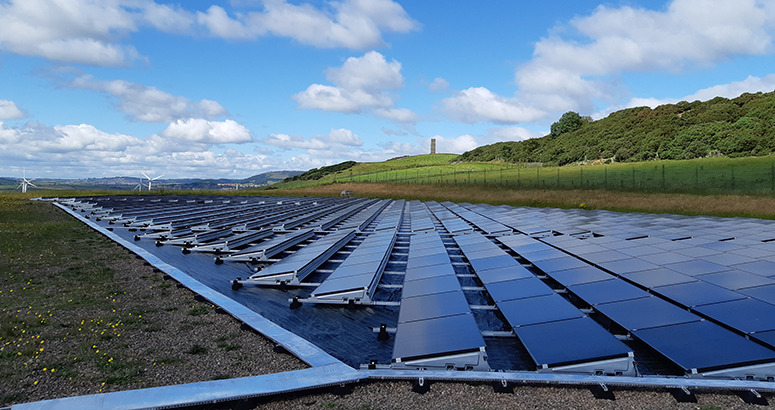
Image: Scottish Water.
Scottish Water has detailed its plans to ramp up its reliance on renewable energy in its net zero roadmap.
The company – one of the country’s largest electricity users – has already completed a number of solar installs, including its most recent project, the 297kW system installed at The Finmont Service Reservoir.
Having unveiled its intentions to reach net zero by 2040 at the same time it announced the completion of this system, the utility has now committed itself to operating all of its assets, including 239 water treatment works and 1,827 waste water treatment works, using renewable power only.
Alongside this, Scottish Water is to reduce the carbon intensity of its £700 million a year investment by 75%, as well as pledging a similar reduction in its supply chain. This will be done by adopting a zero-emissions design and using low carbon construction materials.
Lastly, Scottish Water is to transition its entire fleet of vehicles – currently consisting of 1,600 vehicles – to zero-emissions, as well as reducing its mileage of 17 million miles per annum by 50%.
“This will not be easy,” Scottish Water chief executive, Douglas Millican, said. “We have a substantial emissions footprint due to the large amounts of electricity and chemicals we use.
“This routemap is about doing everything possible to minimise the emissions associated with our activities, irrespective of where they are generated, and maximise the positive contribution we can make.”
Other solar projects completed by the utility include a 1.2MWp array installed in 2017. A year prior, it announced its intention to spending £9 million on solar over the following three years, highlighting its commitment to the technology.
Chris Stark, chief executive of the Committee on Climate Change and a member of an Expert Panel advising Scottish Water, said: “The assets at Scottish Water’s disposal and the renewable energy opportunities on Scottish Water’s estate are vital contributors to the national goal of net zero by 2045.
“Their drive to cut carbon throughout their extensive supply chain will have a cascading impact throughout the Scottish economy. I hope other public bodies in Scotland will now match Scottish Water’s ambition – and their willingness to disclose their climate impact overall.”
Other water utilities are also looking to solar to decarbonise their operations, with HBS to install solar across 21 Welsh Water sites as well as 11.6MWp of solar for Anglian Water.

